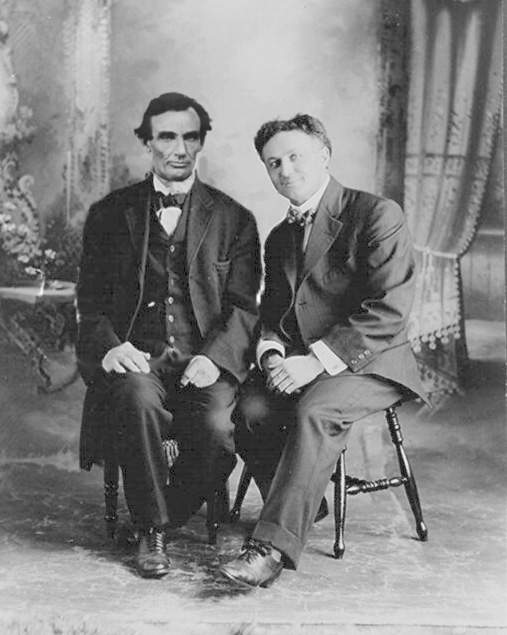
Did you know that Harry Houdini and Abraham Lincoln were good friends and would often meet up? For example, see the picture above.
There is of course one rather glaring flaw here. Lincoln was rather famously assassinated on 15 April 1865, and Houdini was born after that in 1874.
How then is a picture such as the above that long predates photoshop even possible?
Well yes, it is Halloween this week, so I’m writing a bit today about this. Towards the end of his life Houdini devoted a lot of time to exposing fraudsters who attempted to prey upon the grief of the bereaved by pretending that they could communicate with the dead.
Harry Houdini’s First encounter with Abraham Lincoln
For Houdini, Abraham Lincoln was a hero. We can be a tad more precise. Within Kenneth Silverman’s 1996 Biography, it is noted that Houdini referred to Lincoln as “my hero of hereos“. As a teenager young Harry read everything he could find about Lincoln and so he was very familiar with him.
Within another biography, William Kalush’s 2006 biography The Secret Life of Houdini, there is a story about him attending a seance as a young man. The medium was supposedly channeling Lincoln, so young Harry asked a question. What came back was an answer that was wrong. Most would not have known, but he was so well-read on Lincoln that he knew that medium was simply faking.
Robert Todd Lincoln
What is the story behind the picture of Harry and Abe?
There was a medium who claimed to have authentic spirit photos of Abraham Lincoln. To ensure Todd Lincoln was not ensnared by such trickery Houdini sent them to Robert Todd Lincoln along with the one with himself and Lincoln. This was done to point out that they had been faked and that the images used had been lifted from historical pictures of Lincoln.
The most powerful exposure of the trick was to do exactly the same. It revealed how easily this could be done.
It was a truly convincing and very powerful illustration of fraud.
A modern example of this debunking pattern is that when faced with Uri Geller doing his spoon bending in the 1970s and claiming it was a psychic ability, magician James Randi would happily do exactly the same but point out that he was simply doing an illusion. Some would of course claim that while Randi was using trickery, Geller was doing the real thing. Randi’s rebuttal was to explain that if this was true, then Geller was doing it the hard way because the trick was very easy.
Houdini and Mary Edwards Lincoln Brown
Mary Edwards Lincoln Brown was the grand-daughter of Ninian and Elizabeth Edwards, Mary Lincoln’s sister. In 1924 Houdini wrote her the following letter …
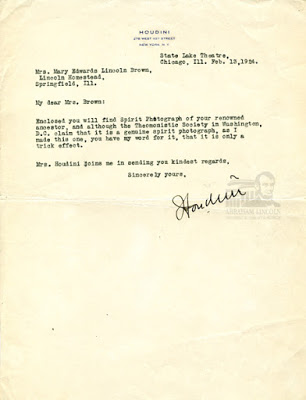 State Lake Theatre, Chicago, Ill. Feb. 13, 1924.
State Lake Theatre, Chicago, Ill. Feb. 13, 1924.
Mrs. Mary Edwards Lincoln Brown,Lincoln Homestead,Springfield, Ill.
My dear Mrs. Brown:
Enclosed you will find Spirit Photograph of your renowned ancestor, and although the Theomonistic Society in Washington, D.C. claim that it is a genuine spirit photograph, as I made this one, you have my word for it, that it is only a trick effect.
Mrs. Houdini joins me in sending you kindest regards,
Sincerely yours,Houdini
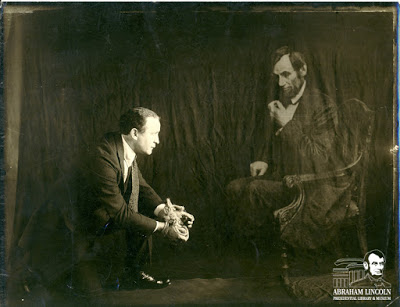
The best Illusionists can fool anybody
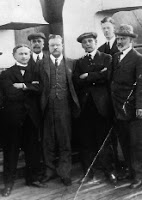
While on board the ocean liner Imperator in 1914, Houdini did a demonstration for his fellow passengers with Spirit Slates. It was amazing stuff. He used it to accurately reveals facts about his fellow passengers that he should not have known.
Some wondered if something supernatural was going on.
Once of those other passengers was Theodore Roosevelt. Quite amazed by what he had seen, he quietly approached Mr Houdini the next day and asked if this “Spiritualism” was real? …
“No, Colonel,” Houdini is said to have answered. “It was just hocus pocus.”
Imagine what might have happened if he had claimed it was real.
Most good illusionists can and will do stuff that is truly mind-blowing and looks very supernatural. They will also make it quite clear that they are simply fooling you. There are also illusionists who will claim that what they are doing really is supernatural so that they can prey upon the gullible.
In the 1920s Houdini spent rather a lot of time exposing psychics and mediums as frauds. He was about to do this because he knew how the trickery worked.
At that time Scientific American offered a cash prize to anybody who could successfully demonstrate supernatural abilities. To ensure nobody conned them, they appointed Houdini to their committee to review claims. Many did try, but nobody ever collected the prize.
Was Houdini the first to expose psychic frauds?
Nope.
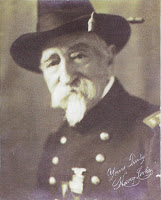
Escape artist and magician Horatio Cooke, born in 1844, was one of Houdini’s inspirations. He is an individual who so amazed Lincoln with his escape act that during the US civil war he appointed him as a union spy. Perhaps Lincoln thought that his abilities to escape would help him if he was ever captured. Lincoln was right, when captured and tied to a tree he did indeed escape.
Cooke went on to bill himself as the “Celebrated King of Spirit Exposers” and devoted his post civil war performances to debunking spiritualists. It so enraged one fanatical believer that he shot him. Cooke recovered, was totally undeterred, and went on exposing the fraudsters for the next quarter of a century.
Houdini went out of his way to get to know Cooke personally, and inevitable he was quite an influence for him. Houdini was in effect his protégé. Within his 1924 book, A Magician Among the Spirits, Houdini credits Cooke for his work in exposing mediums.
Some ignore all evidence
What is truly fascinating is that for some, a belief in the supernatural is deeply entrenched. They can’t accept that it is not real. Sir Arthur Conan Doyle was a firm believer in spiritualism and refused to accept any of Houdini’s exposes. Doyle became convinced that what Houdini was doing was by means of supernatural abilities, and that he was using these abilities to block those of other mediums that he was “debunking”.
Yes, Doyle really was that ensnared by denial.
Humans deeply invested in something can be like this, and so that is why, despite the lack of any evidence, many still believe. They much prefer the comforting lie.
Personally, I recommend believing as many true things as possible, and suspending belief until there is sufficient evidence to justify it.
Further Reading On Houdini
- Wikipedia Page on Houdini
- John Cox’s blog devoted to Houdini contains many fascinating insights – Wild about Harry
- Some fascinating details about Horatio Cooke can be found here and also here.
- Fascinating side note: He went to see Lincoln just after the war ended, was told he was in Ford’s theatre, so popped along and arrived shortly before the rather historic event we are all familiar with.
